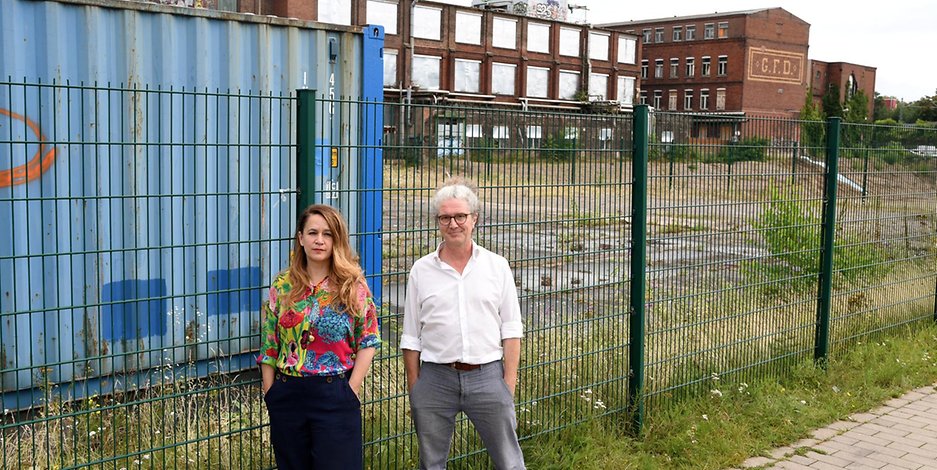cologne –
The city is full of investment properties, so there is no need for other properties, says former Klöckner-Humboldt-Deutz (KHD) president, Anton Schneider. The question of the future of the so-called Otto-und-Langen-Quartier in Mülheim is not only about historical preservation. “It is also about ensuring that a historic opportunity for urban development is not wasted.” Former Ford board member Hermann Holmann, now a spokesman for the Cologne Cultural Council, sees it the same way. The city has to buy the six-hectare area with the former headquarters of KHD and several old factory halls behind it, in order to pave the way for the concepts developed in recent years at the initiative of the artist “Raum 13”.
For the former car and machine makers, it is clear: the place from which the inventions of the gas engine plant in Cologne accelerated the operation of the automobile in the world again, they said at a press conference in the “Villa Charlier” on the Deutz-Mülheimer Strasse nursery center, Who moved here after renovating the former headquarters of KHD’s commercial department, gave asylum to Anja Kolacek, Marc Leßle of “Raum 13” and some fans in their gym.
Doubts about willingness to support
In the Otto-und-Langen-Quartier, animated for more than ten years by art, culture and countless discussions of urban development policy, there is only a shabby container set up by the city administration to support the artists. sad symbol: materials from fixtures and workshops are stored here; Closed behind the fence. Outdoor events can be organized here. But the artists can’t even get their own property right now because the city hasn’t arranged for them to enter.
In the past few weeks, new doubts have been raised about the city administration’s expressed desire to support ideas for community development in the area. Despite many clear, cross-party council decisions, city leaders are delaying purchase of the site. Even before the summer holidays, politicians wanted the city to take advantage of its right of first refusal. The decision is then made at the meeting of the Main Committee during the summer vacation. But then the city manager, still in charge of property policy, Andrea Blum, was surprised by legal concerns and stated that negotiations were taking place with the Jamestown private company in Cologne, businessman Christoph Kahl.
The city has the right of pre-emption for the region
Kahl purchased the former headquarters of KHD from previous owner Gottfried Eggerbauer for $21 million. The city can now conclude the contract via the pre-emptive instrument. Time is running out for Kohl because the city can only interfere with his equity for a limited time. Cal announced that he also wanted to implement the city’s goals for the area as a private investor. How a for-profit company that promises profits to private financial investors can carry out community-oriented development for a typical quarter of an entire city has hitherto been the secret of Jamestown and Cologne’s largest city. It is also unclear why the city administration has not implemented clear and clear council decisions.
Kolasik and Liesel retreat from criticism of management and politics. It is important to them that their advertising for the development of an area that combines many different uses and goals and in which art can not only be a decorative accessory but also an “engine of innovation” still has a chance of practical implementation. Your supporters are already getting clearer: “Politicians should not let the administration dictate what they should do,” says Winfried Gellner of the Cultural and Scientific Advisory Board in Room 13.
A retired spokesperson at Cologne’s cultural office believes the city administration is deliberately blocking the idea. She seems to fear a lot of effort and work and is afraid that something she’s never done might go wrong. Wittich Rossmann, chairman of the Cologne DGB, sees politicians in the Cologne Council coalition responsible: “Either politics is hiding behind the administration or it is not strong enough to assert itself. Both would be embarrassing.”
Saturday show at Huemarket
Next Saturday, at a rally in Heumarkt starting at 2 p.m., the claim that the city should buy the area and not leave it to a private investor will be reiterated. Many supporters want to speak on the podium.
Representatives of the Council Alliance also confirmed their attendance, which once again describes the strange situation on this issue. They will not want to pretend against themselves. Gellner puts it diplomatically: “We are not protesting against something, but for something. This is an encouragement for politicians to assert themselves.”

Communicator. Reader. Hipster-friendly introvert. General zombie specialist. Tv trailblazer

